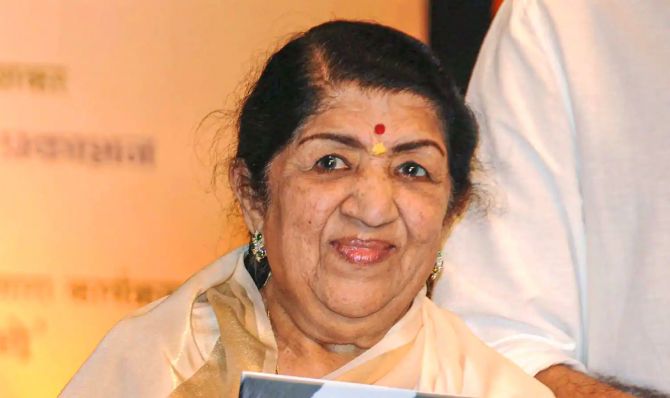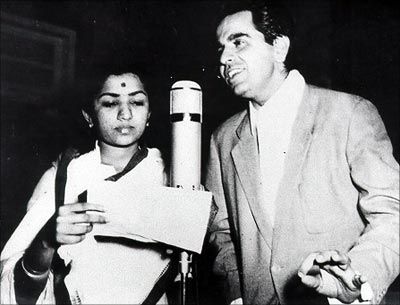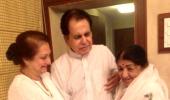'Ein Maharashtrianon ke saath ek problem hotaa hoi -- einke gaane mein daal-bhaath ki boo aatee hai!'
"Those words stung me to such an extent that the following morning itself I started, seriously, learning Urdu with the sole idea of proving the great Dilip Kumar wrong."
Raju Bharatan recalls a memorable incident from Lata Mangeshkar's incredible life.

Dilip Kumar's professionalism lay in the fact that he gave no rival any quarter. Did Lata Mangeshkar, therefore, not merely emulate Dilip Kumar, in adopting a totally pro-approach, when she just outsang that superstar in the Laagi naahein chhute Rama duet, the 1957 happening so keenly awaited in Hrishikesh Mukherjee's Musafir? This after Dilip had insisted that, if at all they expected him to sing in films for the first time, it had to be a duet with Lata!

Still, after the event, Dilip Kumar felt that Lata had opted to render Laagi naahein with a melisma calculated to make him sound a no-no singer. The outcome? Lata and Dilip were not on talking terms through 13 years.
When the two at last met up in August 1970, they made up in style. And that is how we get to see Lata and Dilip bestowed now, in deserving tandem, with Lifetime Achievement Awards by the Union of India. Prized awards fleshing out India's 60 years of Independence as the era in which Lata Mangeshkar and Dilip Kumar achieved a matching charismatic status.
In fact, when the Melody Queen came face to face with the Tragedy King at the megastar's posh Pali Hill bungalow in the West Bandra suburb of Bombay, it felt good to hear Dilip Kumar take the sting out of the whole matter by conceding: "Always remember, Lata, that I'm an actor first, only then a singer. That is, if I'm a singer at all! In the circumstances, how possibly could there be any vocal competition between Lata Mangeshkar and Dilip Kumar?"
I expressed surprise that the two artistes of the same generation struggling and rising together, had not got together long before to resolve any such imagined differences.
"The chance never presented itself," revealed Lata, looking sidelong at Dilip. "If only because Yusuf saab never attended a recording. In fact, the very first recording at which I got to see Dilip Kumar was the one for my Musafir duet with him in the Hrishida film!"
As Dilip smiled, the conversation at the breakfast table simply flowed. This was when Lata chose to drop another clanger.
"You know, Dilip saab," she recalled, "It was sometime in mid-1947. The three of us, master composer Anil Biswas, you and I, were together in a local train. Anilda introduced me to you as a Maharashtrian and as the singer of tomorrow. Do you remember what you then said, Dilip Saab? You said: "A Maharashtrian -- her Urdu would never do!' Not only that, you added: 'Ein Maharashtrianon ke saath ek problem hotaa hoi -- einke gaane mein daal-bhaath ki boo aatee hai!'
"Those words rankled, Yusuf saab," went on Lata. "Those words stung me to such an extent that the following morning itself I started, seriously, learning Urdu with the sole idea of proving the great Dilip Kumar wrong."
"You proved not just me but all others wrong and how!" came back Dilip Kumar, deftly steering clear of his daal-bhaath dart. Dilip further made up by going into raptures about the voice that, on the occasion of Lata Mangeshkar's silver jubilee early in 1967, had been hailed by eminent educationist Chintaman Deshmukh as 'a tuneful symbol of national integration' at the Rang Bhavan in Bombay.
"But who," I later sought to know from Musafir composer Salil Chowdhury, "chose that well-known thumri in Raag Piloo, Laagi naahein chhute Rama, for Dilip to duet with Lata?"
"Dilip himself handpicked the tune!" responded Salil. "Dilip had been practicing this thumri for long hours on the sitar, I merely gave the tune an orchestral rounding. Even so I sensed that Dilip was getting growingly diffident as we approached the hour of recording. Dilip even tried to shy away from the recording at the eleventh hour. We had to give him a peg of brandy before he ventured to stand up to Lata!"
The late Raju Bharatan was Cinema Editor of The Illustrated Weekly Of India .
He was the author of Lata Mangeshkar: A Biography, priced at Rs 295, a book now out of print.
This feature was first posted on Rediff.com in July 2008.










